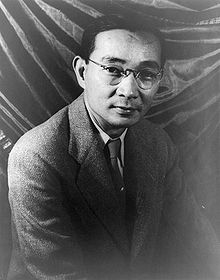Lin Yutang
Lin Yutang ( Chinese 林語堂 / 林语堂 , Pinyin Lín Yǔtáng , Jyutping Lam 4 Jyu 5 tong 4 * 10. October 1895 , Zhangzhou , † 26. March 1976 , Hong Kong ) was a Chinese writer whose articles about Chinese culture and translations of Chinese classics were very popular in Europe and America.
Life
Lin Yutang was born in Pinghe near Zhangzhou, Fujian Province, to a Chinese Presbyterian clergyman. From 1908 he attended a modern middle school in Zhangzhou. Destined to be a cleric by the family, he entered the Protestant College in Xiamen in 1910 . In 1911 he moved to St. John's University in Shanghai, where he studied theology for two years. At the age of 18 he experienced a crisis that resulted in his turning away from Christianity.
In 1919, Lin Yutang decided to continue his studies in the United States. He graduated from the Harvard University its master . He then worked for the YMCA in France.
From 1921 Lin Yutang studied in Germany, one semester at the University of Jena, then at the University of Leipzig, where he received his doctorate in 1923 with a thesis on the subject of ancient Chinese phonetics .
Lin Yutang returned to China from Leipzig and became a professor in the English department of Peking University . In 1926 he took over the management of the English department at the Beijing Teachers' College. He joined a group of liberal lecturers and was forced to leave Beijing as a result. He returned to his home province where he became dean of the College of Arts and Literature at Xiamen University .
In 1927, Lin Yutang took the only political post of his life and became secretary to the foreign minister of the national government in Wuhan. It was only for a few months, however. After 1927, Lin Yutang taught at Dongwu University in Suzhou and the Law College of Shanghai . In 1930 he was appointed director of the Department of Foreign Languages at the Academy of Sciences.
In 1935, Lin Yutang published in the United States his first book My country and my people (My Country and My People). This book became a bestseller, translated into German in 1936, French in 1937, and Chinese in 1938. This made Lin Yutang the first Chinese writer to establish his fame abroad.
Lin Yutang spent the last years of his life mainly in the USA . In his works he tried to bridge the cultural gap between China and the West. He is buried in Taipei .
Quote (sample text)
- What is a story but a chat - a little conversation as the name xiǎo shuō (小说) suggests? So, reader, lend your ear to this chat when you have nothing better to do.
- This narrative is neither an apology for contemporary life in China nor an exposé, as so many of the recently published novels of the 'Dark Curtain' are about. It is neither a glorification of our old ways of life nor a defense of our new ones. It is just a narrative of the way in which men and women of our day grow up and learn to live together, how they love and hate, argue and forgive, suffer and rejoice; how certain customs and ways of thinking have formed, and how they all - in addition - adapt to the circumstances of this earthly life in which people strive and struggle, but the gods rule. LY
- from: Beijing, moment and eternity
Works
-
My Country and My People. (吾 國 與 吾民) (1935)
- My country and my people. From the English by Wilhelm Süskind . Ed. And edit. by Thomas Heberer , with collabor. by Nora Frisch. Drachenhaus-Verlag, Esslingen 2015.
-
The Importance of Living. (生活 的 藝術) (1937)
- German from WE Süskind : Wisdom of the smiling life. As a ro-ro-ro paperback, Reinbek near Hamburg 1960.
- New edition with an afterword by Gabriele Goldfuß : Insel, Frankfurt am Main 2004, ISBN 3-458-34752-6 .
- Between Tears and Laughter. (啼笑皆非) (1943)
- The Chinese Theory of Art. 1967.
-
Moment in Beijing. (京华烟云) (1939)
- German by Lino Rossi (Lucy von Jacoby): Moment in Peking. Gutenberg Book Guild, Zurich, 1943; Fischer, Frankfurt 1950; 2 volumes.
- in the same translation and with the same set-up in three volumes also as: Beijing - Moment and Eternity. 2 volumes, Gutenberg Book Guild , Zurich 1943 and Beijing - Blatt im Sturm, a novel from war-ravaged China. (This in the English original: A Leave in the Storm ) Gutenberg Book Guild, Zurich 1944.
- The Vermillion Gate. (朱門) (1953)
- Chinese-English Dictionary of Modern Usage. (當代 漢英 辭典) (1973).
-
The Importance of Understanding. 1960.
- German by Liselotte Eder and Wolff Eder: happiness of understanding. Ernst Klett Verlag, 1963.
-
The Wisdom of Laotse. 1948.
- German by Gerolf Coudenhove : The wisdom of Laotse. Book club Ex Libris, Zurich.
-
Courtesan ( Miss Tu ). (1950)
- German by Leonore Schlaich: The courtesan. German publishing company, Stuttgart 1951.
literature
- Martin Erbes (co-author): Three studies on Lin Yutang: (1895–1976). Studienverlag Brockmeyer, Bochum 1989, ISBN 3-88339-733-4 .
Web links
- Literature by and about Lin Yutang in the catalog of the German National Library
- China's Best Bilingual Writer Commemorated
- Lin YuTang's Chinese-English Dictionary of Modern Usage
- List of his publications
- Lin Yutang on the Chinese national character (PDF; 918 kB)
| personal data | |
|---|---|
| SURNAME | Lin, Yutang |
| ALTERNATIVE NAMES | 林語堂 |
| BRIEF DESCRIPTION | Chinese writer |
| DATE OF BIRTH | October 10, 1895 |
| DATE OF DEATH | March 26, 1976 |
